Finally, almost one and a half years after the Touya reveal, we get a little more of Dabi’s backstory. And a whole chapter at that! As always, the original Japanese version offers an even better understanding of both the story and the characters so let’s take apart this already emotionally damaging chapter.
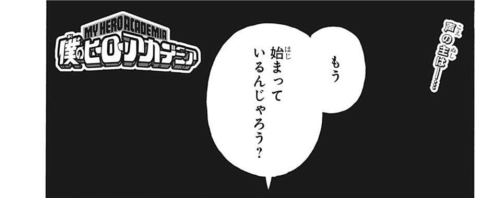
「もう始まっているんじゃろう?」
「もう ; mou 」-> already
「始まっている ; hajimatteiru 」starting
「ん ; n 」-> explanatory particle
「じゃろう ; jarou 」-> right
= “It’s already starting, right?”
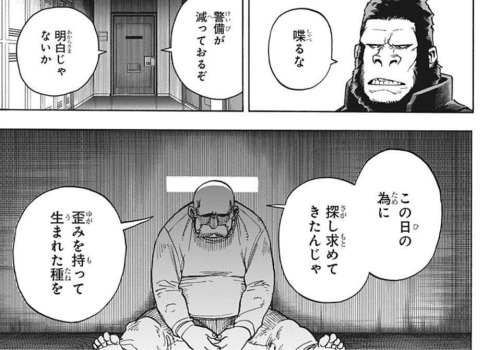
「喋るな」
「喋る ; shaberu 」-> to talk; to chatter
「な ; na 」-> don’t (negative command form)
= “Don’t talk.”
「警備が減っておるぞ 明白じゃないか この日の為に 探し求めてきたんじゃ 歪みを持って生まれた種を」
「警備 ; keibi 」-> defense; guard; security
「が ; ga 」-> subject marker particle
「減っておる ; hetteoru 」-> decreasing
「ぞ ; zo 」-> emphasizes the speaker’s will or opinion; can be inviting to the listener
「明白 ; akarasama 」-> blatant
「じゃない ; janai」-> isn’t it
「か ; ka 」-> question marker particle
「この ; kono 」-> this
「日 ; hi 」-> day
「の為に ; no tame ni 」-> for the sake of
「探し求めてきた ; sagashimotometekita 」-> continued to search/seek/look for (探し求める+てくる)
「んじゃ ; nja 」-> explanatory particle
「歪み ; yugami 」-> distortion; twist
「を ; o 」-> direct object marker
「持って生まれた ; motteumareta 」-> natural (ability)
「種 ; tanu 」-> seed
「を ; o 」-> direct object marker
= “The guards are decreasing. It’s blatantly obvious, isn’t it? For the sake of this day… we have continued to search. For a naturally twisted seed.”
Concerning the word akarasama, there is actually another reading for this kanji combination, namely meihaku. While both mean “obvious” meihaku is referring to an unquestionably clear state that doesn’t require anyone’s actions to be seen and understood. Akarasama, on the other hand, is referring to something becoming obvious through someone’s actions/words. In this case, the fact that there are fewer guards in the police station is what makes it obvious that the battle has begun, even if the police aren’t interested in disclosing this information with Ujiko.
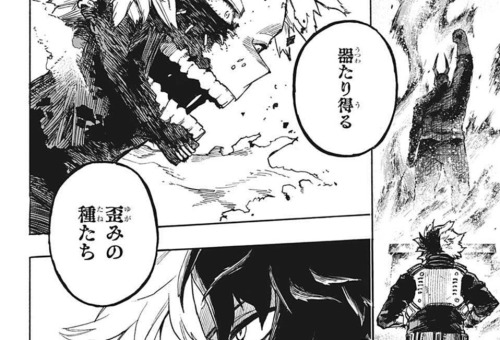
「器たり得る 歪みの種たち」
「器 ; utsuwa 」-> vessel
「たり得る ; tariuru 」-> deserving; worthy
「歪み ; yugami 」-> distortion; twist
「の ; no 」-> possessive particle; similar to an apostrophe
「種たち ; tanutachi 」-> seeds
= “The twisted seeds.”
Tariuru is a combination of the words tariru “sufficient; enough” and uru “to obtain” and together are used when stating that someone is qualified for something, like a job position. Here, it’s used to refer to those “twisted seeds” that are qualified to be vessels.
Japanese doesn’t use plurals. However, you can use certain pluralizers to make it obvious that you are talking about more than one. So while tanu in itself could either mean “seed” or “seeds” adding -tachi clarifies that you are referring to multiple seeds.
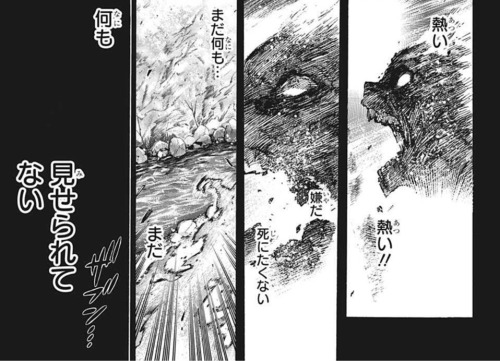
「熱い 熱い!!嫌だ 死にたくない まだ何も… まだ 何も 見せられてない」
「熱い ; atsui 」-> hot
「熱い ; atsui 」-> hot
「嫌 ; iya 」-> disagreeable; hate; no
「だ ; da 」-> be
「死にたくない ; shinitakunai 」-> don’t want to die
「まだ ; mada 」-> still
「何も ; nanimo 」-> nothing
「まだ ; mada 」-> still
「何も ; nanimo 」-> nothing
「見せられてない ; miseraretenai 」-> haven’t shown
= “Hot, hot!! No! I don’t want to die. Still haven’t… still haven’t shown (him).”
Iya da is a phrase that is often used in response to unpleasant situations. In itself, the word iya just means “disagreeable/detestable” - but just saying “Disagreeable!” sounds weird to say the least, hence this usually just gets translated as “no” instead.
Aside from the dialogue in this, I want to also bring attention to the SFX being used here in the far left panel 「ザブン」zabun which means “big splash” -

Interestingly enough, when I was talking with @redphlox about Dabi’s backstory prior to the leaks coming out, she was saying he probably jumped into a river after setting himself on fire and while I feel like you can already see that he is heading towards the river and lying at the end of it when AFO finds him in the next panel, the SFX makes it more obvious since sometimes it can also be hard to make out.
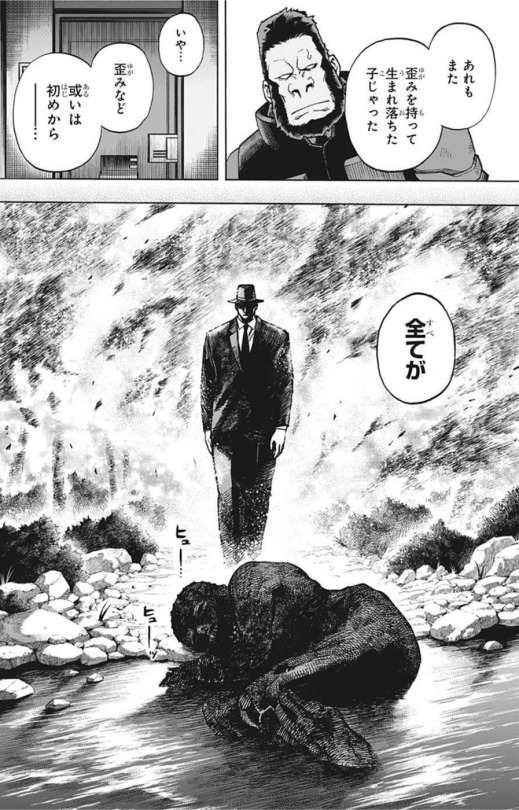
「あれもまた歪みを持って生まれ落ちた子じゃった いや…歪みなど 或いは始めから 全てが」
「あれ ; are 」-> that thing/person
「もまた ; mo mata 」-> expresses surprise
「歪み ; yugami 」-> distortion; twist
「を ; o 」-> direct object marker
「持って ; motte 」-> to have
「生まれ落ちた ; umareochita 」-> was born
「子 ; ko 」-> child
「じゃった ; jatta 」-> was
「いや ; iya 」-> no
「歪み ; yugami 」-> distortion; twist
「など ; nado 」-> and so forth; etc.
「或いは ; arui wa 」-> maybe
「始めから ; hajimekara 」-> from the beginning
「全て ; subete 」-> everything
「が ; ga 」-> subject marker particle
= “That one was a child born twisted. No… distortion and so forth… maybe it was everything from the beginning.”
The mo mata combination here is used for emphasis, showing surprise that Touya was born this way already.
On this page, we get another SFX - this time its 「ヒュー」hyuu which is used for the wind -

I love that for additional meaning it also lists “lonely wind” - it almost makes me wonder if there was actually wind blowing or if this just further emphasizes how alone and abandoned Touya felt (it’s probably just wind but why not make something sad even sadder, right?).

「おねむりくんはやくよくなってね」
「おねむりくん ; onemurikun 」-> Sleep-kun
「はやく ; hayaku 」-> quickly
「よくなって ; yokunatte 」-> become well
「ね ; ne 」-> sentence ending particle; used to seek confirmation
= “Sleep-kun, get well soon, okay?”
I’ve talked about this sign before, but for completion’s sake and because it’s the cutest thing I’ll talk about it again. Hayaku yokunatte means “get well soon” and the ne at the end is used to seek confirmation, so kind of like saying “you will get better soon, right?”
The onemurikun consists of three parts - nemuri simply means “sleep” but it can also mean “inactivity” which is also fitting since he isn’t just asleep, but has been in a coma for three years.
The o at the start is an honorific prefix that you can put in front of words to make them politer. This can also be added in front of people’s names as a nickname, but it’s more commonly used for family members (as seen in the words otousan and okaasan for “dad” and “mom”). And considering he gets told that this can be his “new family” it’s kind of fitting. One of the kids, later on, mentions that she only recently got there but has been told about Sleep-kun from the doctor, so chances are he has been there for longer than most of the kids so the extra respect might be due to that.
The kun is an honorific suffix that gets attached at the end of someone’s name (usually for boys) and indicates a positive relationship, so it’s usually used for friends.
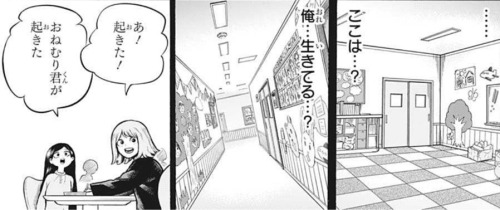
「ここは…? 俺…生きてる…?」
「ここ ; koko 」 -> here
「ha ; wa 」 -> topic marker particle
「俺 ; ore 」 -> I
「生きてる ; ikiteru 」 -> alive
= “Here is…? I… am alive?"
「あ!起きた!」
「あ ; a 」 -> Ah
「起きた ; okita 」 -> woke up
= "Ah! He woke up!"
「おねむり君が起きた」
「おねむり君 ; onemuri kun 」 -> Sleep-kun
「が ; ga 」 -> subject marker particle
「起きた ; okita 」 -> woke up
= "Sleep-kun woke up."
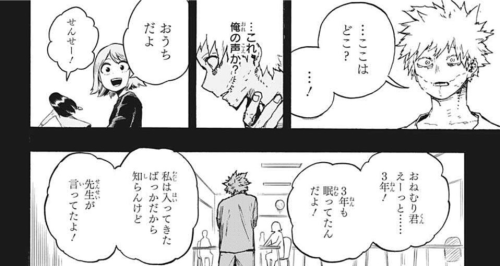
「…ここはどこ? …これ俺の声か?」
「ここ ; koko 」 -> here
「は ; wa 」 -> topic marker particle
「どこ ; doko 」 -> here
「これ ; kore 」 -> this
「俺 ; ore 」 -> I
「の ; no 」 -> possessive particle; similar to an apostrophe
「声 ; koe 」 -> voice
「か ; ka 」 -> question marker particle
= ”…where is here? …this is my voice?“
「おうちだよ」
「おうち ; ouchi 」-> home
「だ ; da 」-> be
「よ ; yo 」-> emphasis particle
= “Home.”
Normally, adding the honorific prefix o in front of a word makes it more polite, so you wouldn’t use it when talking about your own home. In this case, ouchi is more commonly used by children.
「せんせー!」
「せんせー ; sensee 」-> doctooor
= "Doctooor!"
「おねむり君えーっと……3年!3年も眠ってたんだよ! 私は入ってきたばっかだから知らんけど 先生が言ってたよ!」
「おねむり君 ; onemuri kun 」-> Sleep-kun
「おねむり君 ; 」->
「えーっと ; eeetto 」-> ummm
「3年 ; san nen 」-> three years
「3年 ; san nen 」-> three years
「も ; mo 」-> emphasizes number
「眠ってた ; nemutteta 」-> was sleeping
「んだ ; nda 」-> explanatory particle
「よ ; yo 」-> emphasis particle
「私 ; watashi 」-> I
「は ; wa 」-> topic marker particle
「入ってきた ; haittekita 」-> joined (入る+てくる)
「ばっか ; 」-> just
「だから ; dakara 」-> therefore
「知らん ; shiran 」-> don’t know
「けど ; kedo 」-> however
「先生 ; sensei 」-> doctor
「が ; ga 」-> subject marker particle
「言ってた ; itteta 」-> was saying
「よ ; yo 」-> emphasis particle
= “Sleep-kun ummm…… three years! You’ve been sleeping for three whole years! I only just joined so I dunno but the doctor was saying that!”
The mo after san nen is used to emphasize the aforementioned number to show that this number is considered a lot, similar to saying “three WHOLE years”
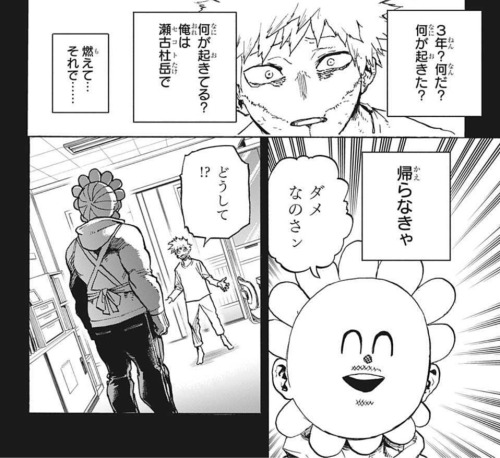
「3年?何だ?何が起きた? 何が起きてる?俺は瀬古杜岳で 燃えて…それで…… 帰らなきゃ」
「3年 ; san nen 」-> three years
「何 ; nan 」-> what
「だ ; da 」-> be
「何 ; nani 」-> what
「が ; ga 」-> subject marker particle
「起きた ; okita 」-> happened
「何 ; nani 」-> what
「が ; ga 」-> subject marker particle
「起きてる ; okiteru 」-> happening
「俺 ; ore 」-> I
「は ; wa 」-> topic marker particle
「瀬古杜岳 ; sekoto take 」-> Sekoto Peak
「で ; de 」-> with
「燃えて ; moete 」-> to burn
「それで ; sore de 」-> and
「帰らなきゃ ; kaeranakya 」-> must return
= “Three years? What? What happened? What is happening? I was at Sekoto Peak, I burned… and then…… I have to go back home.”
「ダメなのさン」
「ダメ ; dame 」-> no good; cannot; not allowed
「なの ; nano 」-> that’s the way it is
「さン ; sa n 」-> emphasis particle
= “Nope, that’s no good, huh.”
Nano is used at the end of a sentence to make an assertion.
The sa n at the end is similar to that, but since Flower Face ends all sentences this way, it’s pretty much just used to make them stand out, so there isn’t a bigger meaning to it other than to make them feel ~quirkier~. To convey this better I will translate this as “huh” here.
「どうして!?」
「どうして ; doushite 」-> why
= “Why!?”

「君はこれからここで皆と暮らすのさン! ここで新しい家族になるのさンきっとすぐに気に入るさン!」
「君 ; kimi 」-> you
「は ; wa 」-> topic marker particle
「これから ; korekara 」-> from now on
「ここ ; koko 」-> here
「で ; de 」-> at
「皆 ; minna 」-> everyone
「と ; to」-> with
「暮らす ; kurasu 」-> to live
「の ; no 」-> explanatory particle
「さン ; sa n 」-> emphasis particle
「ここ ; koko 」-> here
「で ; de 」-> at
「新しい ; atarashii 」-> new
「家族 ; kazoku 」-> family
「になる ; ni naru 」-> to become
「の ; no 」-> explanatory particle
「さン ; sa n 」-> emphasis particle
「きっと ; kitto 」-> surely
「すぐに ; suguni 」-> soon
「気に入る ; kiniiru 」-> to take a liking to
「さン ; sa n 」-> emphasis particle
= “You will live with everyone here from now on, huh! This will become your new family, huh, you will surely take a liking to it soon, huh!”
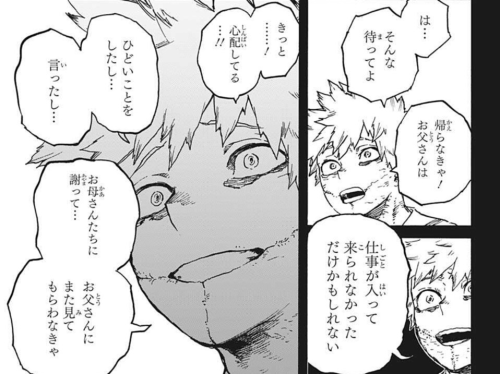
「は…そんな待ってよ 帰らなきゃ!お父さんは 仕事が入って来られなっただけかもしれない きっと……!心配して…!! ひどいことをしたし…言ったし…お母さんたちに謝って…お父さんにまた見てもらわなきゃ」
「は ; ha 」-> ha
「そんな ; sonna 」-> such; no way
「待って ; matte 」-> wait
「よ ; yo 」-> emphasis particle
「帰らなきゃ ; kaeranakya 」-> must return
「お父さん ; otousan 」-> dad
「は ; wa 」-> topic marker particle
「仕事 ; shigoto 」-> work
「が ; ga 」-> subject marker particle
「入って ; haitte 」-> to go into
「来られなった ; korarenakatta 」-> couldn’t come
「だけ ; dake 」-> only
「かもしれない ; kamoshirenai 」-> might
「心配して ; shinpai shite 」-> to worry
「ひどい ; hidoi 」-> awful; terrible
「こと ; koto 」-> thing
「を ; o 」-> direct object marker
「した ; shita 」-> did
「し ; shi 」-> and
「言った ; itta 」-> said
「し ; shi 」-> and
「お母さんたち ; okaasantachi 」-> mom and the others
「に ; ni 」-> to
「謝って ; ayamatte 」-> to apologize
「お父さん ; otousan 」-> dad
「に ; ni 」-> to
「また ; mata 」-> again
「見てもらわなきゃ ; mitemorawanakya 」-> must get (him) to see (見る+もらう+なきゃ)
= “Ha… no way wait- I gotta go back home! Dad possibly only went to work and therefore couldn’t come, surely……! He is worried…!! I did terrible things and… said terrible things and so on… I have to apologize to mom and the others and get dad to see me again.”
The shi means "and” and is used when listing reasons, with the indication that there are more reasons than just the ones you’ve mentioned. Here, Touya is stating that he has to apologize to his family for several things, such as the awful things he’s said and done.
It’s also interesting that he says okaasantachi. The tachi can be attached to someone’s name and loosely be translated to mean “the group X is a part of” to create a plural. He could’ve just said that he needs to apologize to his family, but saying “mom and the others” shows who his priority here is. And we did see the two of them clash quite a bit in chapter 302 -
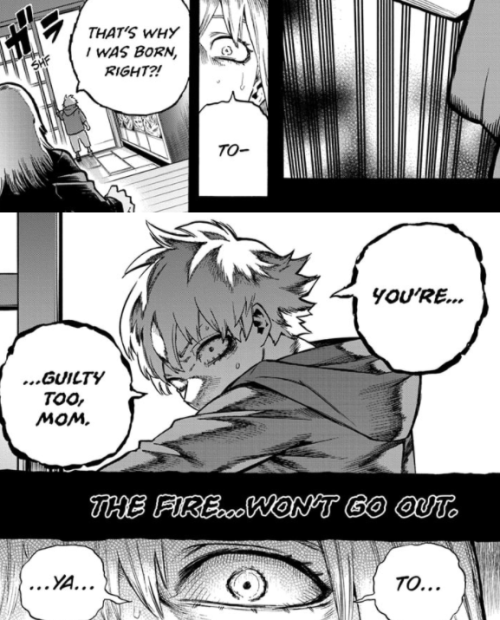
The temorau structure in mitemorawanakya is used when requesting a favor or to get somebody to do something. Combined with nakya meaning “must” this combination means “must get dad to see me again”

「残念だが それはもう…叶わないだらう」
「残念 ; zannen 」-> unfortunate; regrettable
「だが ; daga 」-> but; however
「それ ; sore 」-> that
「は ; wa 」-> topic marker particle
「もう ; mou 」-> anymore
「叶わない ; kanawanai 」-> can’t be realized/fulfilled
「だろう ; darou 」-> probably
= “It’s unfortunate but… that (wish) can probably not be fulfilled anymore.”
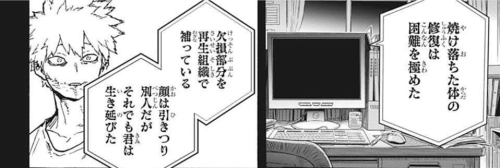
「焼け落ちた体の修復は困難を極めた 欠損部分を再生組織で補っている 顔は引きつり別人だがそれでも君は生き延びた」
「焼け落ちた ; yakeochita 」-> burned down
「体 ; karada 」-> body
「の ; no 」-> possessive particle; similar to an apostrophe
「修復 ; shuufuku 」-> restoration; repair
「は ; wa 」-> topic marker particle
「困難を極めた ; konnan o kimeta 」-> was extremely difficult; presented a major challenge
「欠損 ; kesson 」-> being partially broken/missing/removed
「部分 ; bubun 」-> part
「を ; o 」-> direct object marker
「再生 ; saisei 」-> regeneration (of lost or damage tissue)
「組織 ; soshiki 」-> tissue
「で ; de 」-> with
「補っている ; oginatteiru 」-> being filled/covered
「顔 ; kao 」-> face
「は ; wa 」-> topic marker particle
「引きつり ; hikitsuri 」-> to stiffen
「別人 ; betsujin 」-> different person; changed man
「だが ; daga 」-> but; however
「それでも ; sore demo 」-> nevertheless; but
「君 ; kimi 」-> you
「は ; wa 」-> topic marker particle
「生き延びた ; ikinobita 」-> survived; lived long
= “The restoration of your burned down body was already extremely difficult. The partially missing parts were covered with regenerative tissue. The face is stiff, a changed person. But nevertheless, you survived.”
Hikitsuri comes from the verb hikitsuru and means that the face/expression stiffens. Not in a physical sense but in the sense of looking stressed or tired. It’s connected to the word “changed/different person” here in a cause-effect way to show that these changes essentially made him a different person. “But you survived uwu” At least he got medical care, I guess?

「……何を言ってるのか…分からない……別人?」
「何 ; nani 」-> what
「を ; o 」-> direct object marker
「言ってる ; itteru 」-> saying
「のか ; noka 」-> question marker particle seeking an explanation
「分からない ; wakaranai 」-> don’t understand
「別人 ; betsujin 」-> different person; changed man
= “……what are you saying… I don’t understand……changed person?”
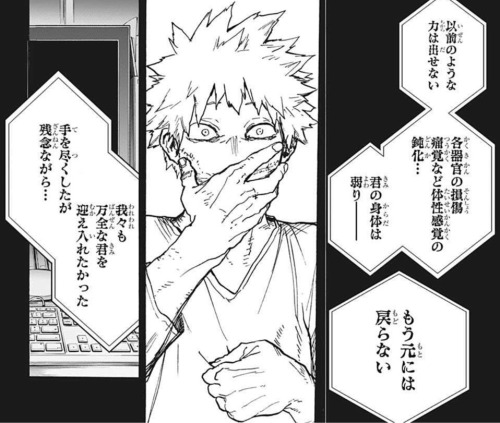
「以前のような力は出せない 各器官の損傷痛覚など体性感覚の鈍化… 君の身体は弱り― もう元には戻らない 我々も万全な君を迎え入れたかった 手を尽くしたが残念ながら…」
「以前 ; izen 」-> before; previous
「のような ; no you na 」-> just like; similar to
「力 ; chikara 」-> power
「は ; wa 」-> topic marker particle
「出せない ; dasenai 」-> can’t produce
「各 ; kaku 」-> each
「器官 ; kikan 」-> organ
「の ; no 」-> possessive particle; similar to an apostrophe
「損傷 ; sonshou 」-> damage; injury
「痛覚 ; tsuukaku 」-> sense of pain
「など ; nado 」-> et cetera; and so forth
「体性感覚 ; taiseikankaku 」-> somatic sensation; somesthesis
「の ; no 」-> possessive particle; similar to an apostrophe
「鈍化 ; donaka 」-> becoming dull; slowing down
「君 ; kimi 」-> you
「の ; no 」-> possessive particle; similar to an apostrophe
「身体 ; karada 」-> body
「は ; wa 」-> topic marker particle
「弱り ; yowari 」-> weak
「もう ; mou 」-> anymore
「元 ; moto 」-> origin; root
「には ; niwa 」-> to
「戻らない ; modoranai 」-> doesn’t return
「我々 ; wareware 」-> we
「も ; mo 」-> also; too
「万全な ; banzen na 」-> perfect; flawless
「君 ; kimi 」-> you
「を ; o 」-> direct object marker
「迎え入れたかった ; mukaeiretakatta 」-> wanted to welcome
「手を尽くした ; te o tsukushita 」-> tried all possible means
「が ; ga 」-> subject marker particle
「残念ながら ; zannen nagara 」-> regrettably; unfortunately
= “You can’t produce power just like before. The sense of pain, the damage, and so forth, of each organ, the becoming dull of your somatic sensations…Your body is weak - it won’t return to its origin anymore. We wanted to welcome the flawless you. I tried all possible means, unfortunately…”
Okay so, if you’re like me and are not an expert in the medical field, let’s educate ourselves a bit more because in cases like this, translating it into English doesn’t make it easier to understand. Somatic sensation refers to the sensory system, the part of your body that makes you feel touchable things such as temperature and pain.
Back in chapter 301 when the Todoroki family backstory came out, we got that scene of Dabi lying on a sofa looking at his hand and stating that he can’t feel a thing.
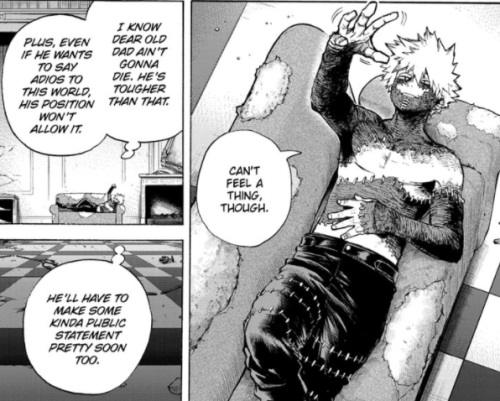
Back then, I pointed out that it wasn’t clear yet whether he was referring to physical or emotional numbness, but it is now obvious that he was, in fact, talking about physically not feeling the pain. In hindsight, it is obvious since “can’t feel anything” is a follow-up to the panel showing how much the burns on his hand had spread and commenting on that.
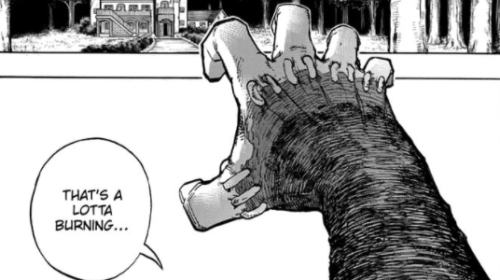
This condition has probably worsened over time, considering that he kept training. With his scars spreading, his physical ability to feel decreased.
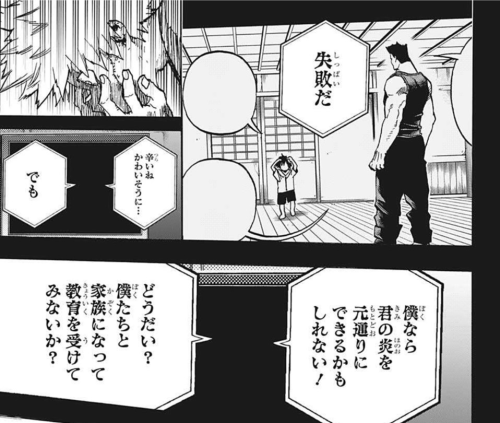
「失敗だ 辛いねかわいそうに…でも 僕なら君の炎を元通りにできるかもしれない! どうたい?僕たちと家族になって教育を受けてみないか?」
「失敗 ; shippai 」-> failure; mistake
「だ ; da 」-> be
「辛い ; tsurai 」-> painful; tough; cruel
「ね ; ne 」-> sentence ending particle; used to seek confirmation
「かわいそうに ; kawaisouni 」-> what a pity!; poor thing!
「でも ; demo 」-> but
「僕 ; boku 」 - > I
「なら ; nara 」-> as for; if
「君 ; kimi 」-> you
「の ; no 」-> explanatory particle
「炎 ; honoo 」-> flame
「を ; o 」-> direct object marker
「元通り ; motodoori 」-> as before; as it was originally
「に ; ni 」-> at
「できる ; dekiru 」-> able to
「かもしれない ; kamoshirenai 」-> might
「どう ; dou 」-> how
「たい ; tai 」-> emphasis particle
「僕たち ; bokutachi 」-> us
「と ; to 」-> with
「家族 ; kazoku 」-> family
「になって ; ninatte 」-> to become
「教育 ; kyouiku 」-> education; training
「を ; o 」-> direct object marker
「受けてみない ; uketeminai 」-> won’t you try to receive
「か ; ka 」-> question marker particle
= “A failure. Tough, isn’t it. Poor thing… but, I might be able to return your flames to what they were before! How about it? Won’t you try to become a family with us and receive my training?”
Nara usually means “if” but it can be attached to someone’s name like a topic marker particle. It draws a bit more attention to AFO here, sort of like creating a condition: “if it’s me” or “as for me”. AFO, the great savior…
The reason why the uketeminai at the end is in the negative form is that it’s common to use a negative verb form when inviting someone to do something.
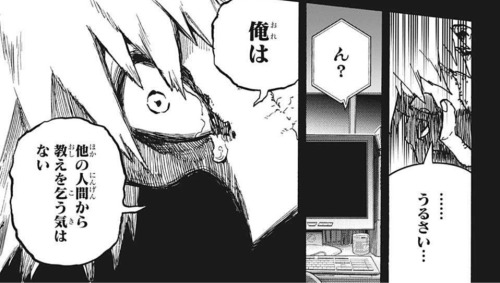
「……うるさい…」
「うるさい ; urusai 」-> shut up
= “……shut up…”
「ん?」
「ん ; n 」-> huh
= “Huh?”
「俺は 他の人間から教えを乞う気はない」
「俺 ; ore 」-> I
「は ; wa 」-> topic marker particle
「他 ; hoka 」-> other
「の ; no 」-> possessive particle; similar to an apostrophe
「人間 ; ningen 」-> human; person
「から ; kara 」-> from
「教え ; oshie 」-> instruction; lesson; teaching
「を ; o 」-> direct object marker
「乞う ; kou 」-> to beg; to ask; to request
「気はない ; ki wa nai 」-> having no intention of; being in no mood for; not feeling like doing
= “I have no intention of begging for instructions from other people.”
Kou is an interesting word here because it’s not written with the more commonly used kanji (請う). The more common way of writing this word is used when referring to asking someone for forgiveness or instructions - which funnily enough is what he is talking about here. 乞う, on the other hand, is used when talking about begging for something, like things or money. In other words, the kanji used here carries a more desperate nuance to it. Despite them claiming to be able to help him get his body back to how it used to be, Touya isn’t going to desperately beg for their help. He doesn’t need anyone. Just his dad.

「導くには育ち過ぎていた 爛れ過ぎていた 遍く全てを支配する男でさえ その父親への執着には付け入る事はかなわなかった」
「導く ; michibiku 」-> to guide
「には ; niwa 」-> as for
「育ち過ぎていた ; sodachisugiteita 」-> overgrown
「爛れ過ぎていた ; tadaresugiteita 」-> to be too indulged in
「遍く ; amanuku 」-> widely; extensively
「全て ; subete 」-> everything
「を ; o 」-> direct object marker
「支配する ; shihai suru 」-> dominated; controlled
「男 ; otoko 」-> man
「でさえ ; desae 」-> even
「その ; sono 」-> that
「父親 ; chichioya 」-> dad
「へ ; e 」-> to
「の ; no 」-> possessive particle; similar to an apostrophe
「執着 ; shuuchaku 」-> fixation; obsession
「には ; niwa 」-> as for
「付け入る ; tsukeiru 」-> to take advantage (of someone’s weaknesses)
「事 ; koto 」-> nominalizes prior word/phrase
「は ; wa 」-> topic marker particle
「かなわなかった ; kanawanakatta 」-> wasn’t realized/met/fulfilled
= “Too grown, too indulged to lead. Even the man widely all-controlling. Taking advantage of the obsessions with his dad wasn’t realized.”
The sugiteita that appears twice in this line means “too much” so it means “doing too much” of the verb it attaches to. Both of these words are used to say that this obsession had been going on for way too long and thus any attempt from AFO to manipulate and use Touya was unsuccessful.

「死柄木弔に何かがあった時の保険(スペア) 猛き憎しみの苗床 魔王の器」
「死柄木弔 ; shigaraki tomura 」-> Tomura Shigaraki
「に ; ni 」-> to
「何か ; nanika 」-> something
「が ; ga 」-> subject marker particle
「あった ; atta 」-> happened
「時 ; toki 」-> case
「の ; no 」-> possessive particle; similar to an apostrophe
「保険 ; hoken」-> insurance; guarantee
「スペア ; supea 」-> spare
「猛き ; takeki 」-> fierce
「憎しみ ; nikushimi 」-> hatred
「の ; no 」-> possessive particle; similar to an apostrophe
「苗床 ; naedoko 」-> seedbed; seed-plot
「魔王 ; maou 」-> Demon Lord
「の ; no 」-> possessive particle; similar to an apostrophe
「器 ; utsuwa 」-> vessel
= “A guarantee (spare) in case something happened to Tomura Shigaraki. A seedbed of fierce hatred. The Demon Lord’s vessel.”
In the first part, we have the word “guarantee/insurance” based on how the word is written in kanji, and that is what Ujiko means. However, the furigana next to the kanji are actually written in katakana and read “spare” so that is what he is saying here. Touya was there as a spare, but it’s like insurance for them should anything go wrong with Shigaraki.
Takeki is an adjective that means “fierce” and is used to describe someone strong-minded.

「荼毘はそんな保険(スペア)の一つで 失敗作じゃった」
「荼毘 ; dabi 」-> Dabi
「は ; wa 」-> topic marker particle
「そんな ; sonna 」-> such
「保険 ; hoken」-> insurance; guarantee
「スペア ; supea 」-> spare
「の ; no 」-> possessive particle; similar to an apostrophe
「一つ ; hitotsu 」-> one
「で ; de 」-> and
「失敗作 ; shippaisaku 」-> failed creative work
「じゃった ; jatta 」-> was
= “Dabi was one of such spares and…he was a failure.”
Shippaisaku is the same word Dabi always uses when referring to himself as “failure” as opposed to Shouto the “masterpiece”.
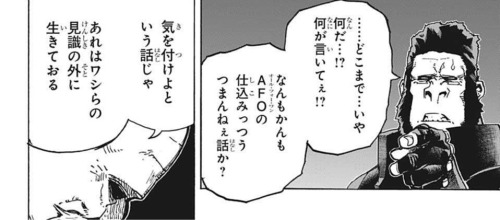
「……どこまで…いや何だ…!?何が言いてぇ!?なんもかんもAFOの仕込みっつうつまんねぇ話か?」
「どこまで ; dokomade 」-> how far; to what extent
「いや ; iya 」-> no
「何だ ; nanda 」-> what!; what the
「何 ; nani 」-> what
「が ; ga 」-> subject marker particle
「言いてぇ ; iitee 」-> saying
「なんもかんも ; nanmokanmo 」-> anything and everything; just about everything
「AFO ; ooru foa wan 」-> AFO
「の ; no 」-> possessive particle; similar to an apostrophe
「仕込み ; shikomi 」-> preparation; upbringing
「っつう ; ttsuu 」-> quotation marker; to be said
「つまんねぇ ; tsumannee 」-> boring
「話 ; hanashi 」-> stories
「か ; ka 」-> question marker particle
= “……how far… no, what the-!? What are you saying!? Is this one of those boring so-called ‘just about everything about AFO’s upbringing’ stories?”
「気を付けよという話じゃ あれはワシらの見識の外に生きておる」
「気を付け ; ki o tsuke 」-> be careful
「よ ; yo 」-> emphasis particle
「という ; to iu 」-> so-called
「話 ; hanashi 」-> story
「じゃ ; ja 」-> to be
「あれ ; are 」-> that thing/person
「は ; wa 」-> topic marker particle
「ワシら ; washira 」-> us
「の ; no 」-> possessive particle; similar to an apostrophe
「見識 ; kenshiki 」-> views
「の ; no 」-> possessive particle; similar to an apostrophe
「外 ; soto 」-> outside
「に ; ni 」-> to
「生きておる ; ikiteoru 」-> existing
= “It’s a ‘be careful!’ story. That thing exists outside our view.”
Noticing the “that thing” here? We’ll get to that in a bit.

「ワシらは放っておいたなぜなら 荼毘の身体は目覚めて動き始めた以上 一月と保たぬはずじゃった」
「ワシら ; washira 」-> we
「は ; wa 」-> topic marker particle
「放っておいた ; hanatteoita 」-> set free; released (放つ+ておく)
「なぜなら ; nazenara 」-> because; the reason is; if you want to know
「荼毘 ; dabi 」-> Dabi
「の ; no 」-> possessive particle; similar to an apostrophe
「身体 ; karada 」-> body
「は ; wa 」-> topic marker particle
「目覚めて ; mezamete 」-> to wake up
「動き始めた ; ugokihajimeta 」-> started to move
「以上 ; ijou 」-> now that
「一月 ; hitotsuki 」-> one month
「と ; to 」-> as many
「保たぬ ; motanu」 -> doesn’t last; doesn’t endure
「はず ; hazu 」-> ought to
「じゃった ; jatta 」-> was
= “The reason why we let him go is now that Dabi’s body woke up and started to move, it ought to not last for even as much as a month.”
The teoita at the end of hanatteoita means to do something in advance, usually in preparation for future convenience. Both the word choice and the -teoita at the end are interesting to me because it makes it sound like AFO and Ujiko willingly let him go and planned on doing so as the result of some cleverly created scheme when in reality, Touya said “nope” and left and there was nothing anyone could do about it.
The to after one month is used to emphasize that the number is considered to be large. In other words, the idea of Touya surviving for more than a month is unrealistic already, so seeing him again after seven years was basically impossible and not something Ujiko expected. This also shows that there is obviously something more to Dabi’s quirk and some unknown element to him that keeps him alive against all odds.
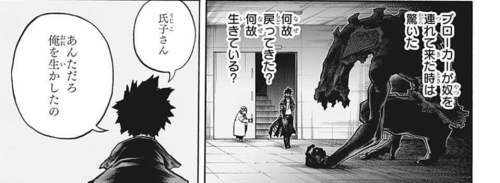
「ブローカーが奴を連れて来た時は驚いた」
「ブローカー ; burookaa 」-> broker
「が ; ga 」-> subject marker particle
「奴 ; yatsu 」-> him; guy
「を ; o 」-> direct object marker
「連れて来た ; tsuretekita 」-> brought someone
「時 ; toki 」-> when
「は ; wa 」-> topic marker particle
「驚いた ; odoroita 」-> surprised
= “We were surprised when the broker brought him.”
The tekita at the end of tsuretekita means someone brought someone/something to you (kuru means “to come” so this literally just means “to take someone and come somewhere”).
「何故戻ってきた?何故生きている?」
「何故 ; naze 」-> why; how
「戻ってきた ; modottekita 」-> returned
「何故 ; naze 」-> why; how
「生きている ; ikiteiru 」-> to be alive
= “Why did you come back? How are you alive?”
Again, the tekita means coming toward the speaker, so returning to AFO and Ujiko.
Naze is a very direct way of asking someone’s reason for something. So what is his motive for going back to AFO and Ujiko? In the second sentence, it means “how” since Ujiko mentioned earlier that they expected him to not even live for another month.
「氏子さん あんただろ俺を生かしたの」
「氏子さん ; ujiko san 」-> Ujiko-san
「あんた ; anta 」-> you
「だろ ; daro 」-> right?; probably
「俺 ; ore 」-> I
「を ; o 」-> direct object marker
「生かした ; ikashita 」-> to keep alive「の ; no 」-> explanatory particle
= “Ujiko-san- it was you who kept me alive, right?”
Something I want to point out here that sticks out a lot is that Dabi addresses Ujiko as “Ujiko-san” the -san being an honorific prefix that you attach to people’s names out of respect. While this is common in Japanese in general, it’s not common for Dabi and is something that has been questioned by the Japanese side of the fandom since chapter 191, when Dabi called out to Ujiko to teleport him away from the scene after Miruko showed up to the fight against Endeavor and Hawks.
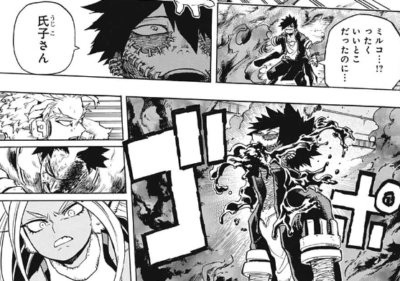
And even though we now have confirmation that Dabi knew Ujiko prior to even joining the LOV, considering he almost got turned into a Nomu by him, it feels odd for him to address him this way.
Aside from addressing him as Ujiko-san, he also uses anta when saying “you”. Anta is a less formal/polite version of anata, which is also generally not used as it’s considered too direct. However, it’s not as rude as omae. So while Dabi could be more disrespectful, he actually is being more polite with him than with anyone else we’ve seen thus far - the problem is that making a comparison is impossible for now as we haven’t seen him talk with anyone where speaking more politely would be the appropriate thing to do. Sometimes, being more formal can also be used in a sarcastic way, but for now, it’s hard to determine what the exact reason is.
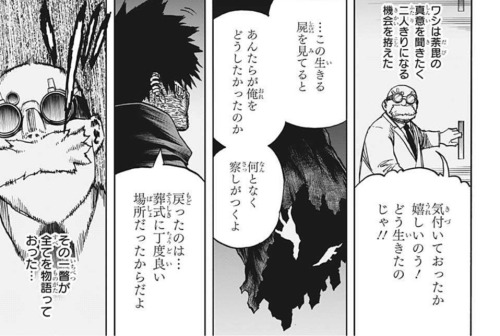
「ワシは荼毘の真意を聞きたく二人きりになる機会を拵えた」
「ワシ ; washi 」-> I
「は ; wa 」-> topic marker particle
「荼毘 ; dabi 」-> Dabi
「の ; no 」-> possessive particle; similar to an apostrophe
「真意 ; shini 」-> true motive; real intention
「を ; o 」-> direct object marker
「聞きたく ; kikitaku 」-> wanted to ask
「二人きり ; futari kiri 」-> just the two of them
「になる ; ni naru 」-> to become
「機会 ; kikai 」-> chance; opportunity
「を ; o 」-> direct object marker
「拵えた ; koshiraeta 」-> made; manufactured
= “I wanted to ask Dabi’s true motive and made an opportunity to be just the two of us.”
「嬉しいのう!どう生きたのじゃ!!」
「嬉しい ; ureshii 」-> glad
「のう ; nou 」-> emphasis particle
「どう ; dou 」-> how
「生きた ; ikita 」-> lived
「のじゃ ; no ja 」-> explanatory particle
= “I’m glad! How did you live!!”
「…この生きる屍を見てるとあんたらが俺をどうしたかったのか何となく察しがつくよ 戻ったのは…葬式に丁度良い場所だったからだよ」
「この ; kono 」-> this
「生きる ; ikiru 」-> to live; to come to life
「屍 ; shikabane 」-> corpse
「を ; o 」-> direct object marker
「見てる ; miteru 」-> seeing
「と ; to 」-> when
「あんたら ; antara 」-> you (plural)
「が ; ga 」-> subject marker particle
「俺 ; ore 」-> I
「を ; o 」-> direct object marker
「どう ; dou 」-> what
「したかった ; shitakatta 」-> wanted to do
「のか ; noka 」-> question marker particle seeking an explanation
「何となく ; nantonaku 」-> somehow or other; for some reason or another; without knowing why
「察しがつく ; sasshi ga tsuku 」-> can guess
「よ ; yo 」-> emphasis particle
「戻った ; modotta 」-> returned
「のは ; no wa 」-> nominalizes prior word
「葬式 ; soushiki 」-> funeral
「に ; ni 」-> for
「丁度良い ; choudoii 」-> just right
「場所 ; basho 」-> place
「だった ; datta 」-> was
「から ; kara 」-> because
「だ ; da 」-> be
「よ ; yo 」-> emphasis particle
= “When I saw this living corpse I was able to guess what you guys wanted to do to me, you know. Returning… because it was just the right place for a funeral.”
There are a few ways to refer to a corpse in Japanese, but shikabane is used for a dead body that has been abandoned and not buried (a dead body that isn’t shown proper respect), so the perfect word to describe the Nomu.
Normally, to say “what” you use the word nani. However, dou can be used in a more general sense without specifying anything.
Sasshi ga tsuku can be translated as “being able to guess” and refers to the ability to figure out someone else’s thoughts, etc. from what you know so far. So based on seeing the Nomu, Dabi was able to picture what his fate was supposed to be, had he not escaped.
「その一瞥が全てを物語っておった…」
「その ; sono 」-> that
「一瞥 ; ichibetsu 」-> a glance
「が ; ga 」-> subject marker particle
「全て ; subete 」-> everything; all; entirely
「を ; o 」-> direct object marker
「物語っておった ; monogatteotta 」-> was telling a story
= “That one glance was telling the whole story…”
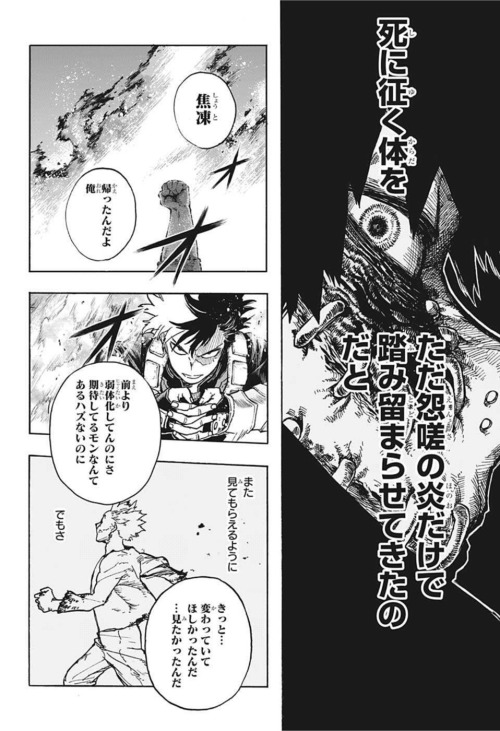
「死に征く体を ただ怨嗟の炎だけで踏み留まらせてきたのだと」
「死に征く ; shiniyuku 」-> conquering nearing death
「体 ; karada 」-> body
「を ; o 」-> direct object marker
「ただ ; tada 」-> only
「怨嗟 ; ensa 」-> (deeply held) resentment
「の ; no 」-> possessive particle; similar to an apostrophe
「炎 ; honoo 」-> flames
「だけ ; dake 」-> only
「で ; de 」-> with
「踏み留まらせてきた ; fumitodomarasetekita 」-> continued to make (the body) remain/hold one’s ground/stay on (踏み留まる+てきた)
「の ; no 」-> explanatory particle
「だ ; da 」-> be
「と ; to 」-> quotation particle
= “It said that that body conquering near death has only and only been let to continuously remain by the flames of deep resentment.”
Shiniyuku is usually not spelled with that second kanji, however, the kanji that is being used here (征) means “to conquer” so while shiniyuku itself means “to near death” with this kanji it adds the fact that, while his body seems like it’s nearing death, still being alive against all odds also means he somehow managed to conquer that state.
As you might have noticed there are two words in this sentence that mean “only” - tada and take. The reason they are both being used, despite saying just one of them would be enough as well, is that it adds more emotion to it and also stresses that there is really just that one single reason.
That unnecessarily long word fumitodomarasetekita is the word fumitodomaru in its causative form, meaning “to make someone do something” combined with the tekita form meaning something continued up until now. Instead of “make” the causative form can also mean to “let” someone do something, however, considering his personality and the overall context, translating this as Dabi making his body stay together out of spite makes more sense. It really emphasizes the fact that he won’t let his body die that easily because there is still something he needs to do before that can happen so he is making it stay alive even if that should be impossible. To summarize:
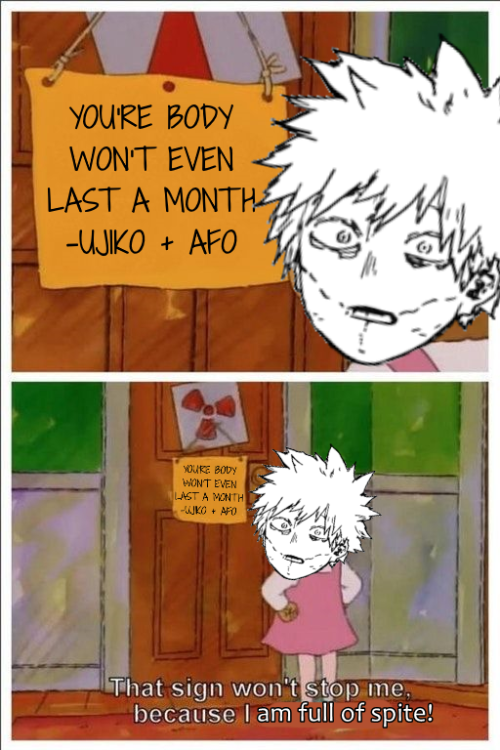
「焦凍 帰ったんだよ俺 前より弱体化してんのにさ期待してるモンなんてあるハズないのに」
「焦凍 ; shouto 」-> Shouto
「帰った ; kaetta 」-> returned
「んだ ; nda 」-> explanatory particle
「よ ; yo 」-> emphasis particle
「俺 ; ore 」-> I
「前 ; mae 」-> before; previously
「より ; yori 」-> than
「弱体化してん ; jakutaika shiten 」-> is weakening
「のに ; noni 」-> even though
「さ ; sa 」-> emphasis particle
「期待してる ; kitai shiteru 」-> expecting; hoping; anticipating
「モン ; mon 」-> anything
「なんて ; nante 」-> used for emphasis/adds emotion
「ある ; aru 」-> to be
「ハズない ; hazu nai 」-> can’t be; it’s impossible that~
「のに ; noni 」-> even though
= “Shouto. I did return, you know. Even though I was weaker than before. Even though it’s impossible for there to be anything to expect.”
Nante is a word that can be added to emphasize the word it attaches to in an emotional way and can be either negative or positive.
「また見てもらえるように でもさ」
「また ; mata」-> again
「見てもらえる ; mitemoraeru 」-> be able to get (him) to see
「ように ; you ni 」-> hoping or wishing for something
「でも ; demo 」-> but
「さ ; sa 」-> emphasis particle
= “I’m hoping to be able to get him to see me again. But-“
The temorau is used to request a favor or when getting someone to do something. Here, it’s in the potential form so it means “being able to get him to look again”
You ni is used to mean "in order to” when expressing that you want a certain result. Normally, this construction consists of the verb that you want as a result (in this case, getting his dad to look at him again) + you ni + the verb of what you did/do in order to get that desired result. That last verb isn’t included here but since this is a follow-up to him telling Shouto that he did return, it basically means “I returned in order to be able to get dad to see me again.”
「きっと…変わっていてほしかったんだ…見たかったんだ」
「きっと ; kitto 」-> surely
「変わっていてほしかった ; kawatteitehoshikatta 」-> wanted something to be different
「んだ ; nda 」-> explanatory particle
「見たかった ; mitakatta 」-> wanted to see
「んだ ; nda 」-> explanatory particle
= “Surely… I wanted it to be different… wanted to see.”
The tehoshii is used to express the speaker’s desire for someone else to do something. So Touya wanted things to be different now. Despite having had a near-death experience, being in a coma for three years, and waking up being told how damaged his body had become, he at least wanted all of that to have changed his family situation. Despite all the trauma he and his body went through, he wanted his family to be happy, he wanted his home to not be a place of abuse and trauma anymore. Hey, remember all the people claiming Dabi hates his family and wants them to suffer or whatever? Anyway… despite the tunnel vision that he already had for Endeavor back then, he still thought about everyone else in his family and how he wanted to apologize to everyone. Just imagine going through what this boy has gone through and then being so selfless that you just want your family to be happy and healthy…
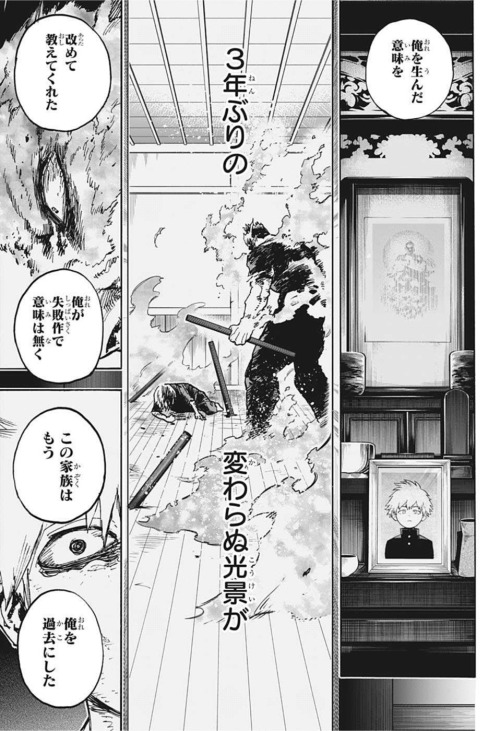
「俺を生んだ意味を」
「俺 ; ore 」-> I
「を ; o 」-> direct object marker
「生んだ ; unda 」-> produced; gave birth to
「意味 ; imi 」-> meaning
「を ; o 」-> direct object marker
= “The reason I was born…”
「3年ぶりの変わらぬ光景が」
「3年 ; san nen 」-> three years
「ぶり ; buri 」-> after; again
「の ; no 」-> possessive particle; similar to an apostrophe
「変わらぬ ; kawaranu 」-> unchanged
「光景 ; koukei 」-> scene; view; spectacle
「が ; ga 」-> subject marker particle
= “An unchanged scene after three years…”
「改めて教えてくれた 俺が失敗作で意味は無く この家族はもう 俺を過去にした」
「改めて ; aratamete 」-> again
「教えてくれた ; oshietekureta 」-> to be taught/shown
「俺 ; ore 」-> I
「が ; ga 」-> subject marker particle
「失敗作 ; shippaisaku 」-> failed creative work
「で ; de 」-> with
「意味 ; imi 」-> meaning
「は ; wa 」-> topic marker particle
「無く ; naku 」-> non-existent
「この ; kono 」-> this
「家族 ; kazoku 」-> family
「は ; wa 」-> topic marker particle
「もう ; mou 」-> already
「俺 ; ore 」-> I
「を ; o 」-> direct object marker
「過去 ; kako 」-> past
「にした ; ni shita 」-> to decide on; to make
= “…showed me again. I was a failure with no meaning. This family had already put me in the past.”
The kureta means that the speaker is receiving a favor from someone. Here, returning home after three years, full of hope that his family was now a healthy and happy one only to find that his dad was still abusing Shouto in the same way he had before almost as no time had passed at all, showed him again that his life was meaningless. This also references chapter 290, where Dabi mentions that he used to always go to Natsuo, crying, asking him why he even existed -

meaning he had spent this whole time trying to find a meaning for all the pain he had endured in his life, but even now that he had been gone for three years and his family considered him dead, nothing changed. So even something as traumatic as losing a family member had no effect on Endeavor. With dying being about the most extreme thing that Touya could have done, for even that to not even have the slightest effect makes it feel almost like he never existed in the first place. Yes, there is an altar to remember him by, but what else?
It is normal and natural to try and find meaning to one’s trauma in order to cope and thus find acceptance, also referred to as “meaning-making” -
“From the time you are developing in the womb until your dying day, you will experience many small and large injuries to your psyche, your sense of self, and your understanding of the world. […] The meaning you make of these events will either weaken you or help you build resilience. The story you tell yourself about the event will either tie you to the trauma and limit you or help you create a life you love by giving you new depth and insight into yourself.
Psychologists call this process meaning-making. The meaning you give to a loss or trauma can have a profound effect on your life. For example, if […] your emotions were ignored or invalidated by a caregiver, “No one believes me when I say I’m sad, so I’ll have to act out in order to receive the love and care I need” might be the meaning you make from the situation.
Trauma and loss can undermine your fundamental belief in a predictable and just world. It can require you to rebuild or readjust your previously held beliefs and assumptions. That rebuilding and readjusting can be healthy or unhealthy, either helping you to live a better, more whole, and happy life or weakening your spirit and increasing your unhappiness, depending on the meaning you make from your experience.”
For Touya, the meaning he tried to make was that suffering leads to healing. The problem is that this meaning was immediately taken away from him as soon as he returned home because the scene remained unchanged. The meaning he wanted to assign to his trauma was nothing but a wish and reality showed him just that.
So if even death couldn’t change his dad or the family situation as a whole, then what meaning was there? What could Touya do anymore at this point? What could possibly get through to Endeavor, if even death wasn’t enough?
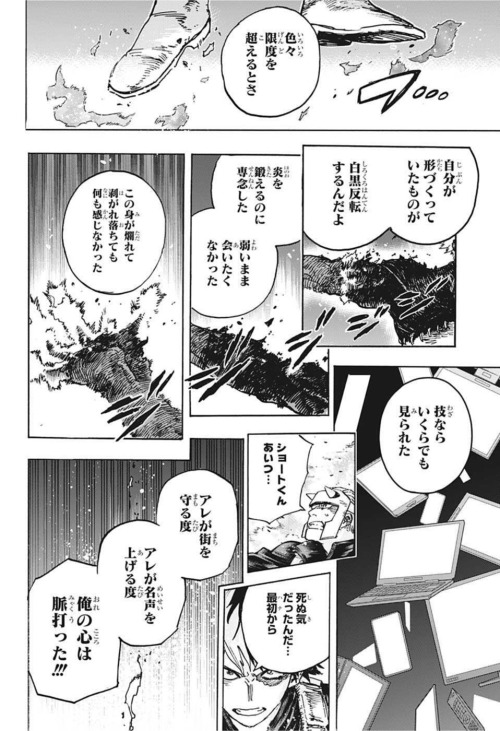
「色々限度を超えるとさ 自分が形づくっていたものが 白黒反転するんだよ 炎を鍛えるのに専念した 弱いまま会いたくなかった この身が爛れて剝がれ落ちても何も感じなかった」
「色々 ; iroiro 」-> various
「限度を超える ; gendo o koeru 」-> to go beyond the limit; to pass the limit
「とさ ; to sa 」-> they say; you know
「自分 ; jibun 」-> oneself
「が ; ga 」-> subject marker particle
「形づくっていた ; katachizukutteita 」-> was forming/making/building up
「もの ; mono 」-> thing
「が ; ga 」-> subject marker particle
「白黒反転する ; shirokuro hanten suru 」-> monochrome inversion
「んだ ; nda 」-> explanatory particle
「よ ; yo 」-> emphasis particle
「炎 ; honoo 」-> flames
「を ; o 」-> direct object marker
「鍛える ; kitaeru 」-> to drill; to train
「のに ; noni 」-> in order to
「専念した ; sennen shita 」-> devoted oneself to
「弱い ; yowai 」-> weak
「まま ; mama 」-> remaining in a state
「会いたくなかった ; aitakunakatta 」-> didn’t want to meet
「この ; kono 」-> this
「身 ; mi 」-> body
「が ; ga 」-> subject marker particle
「剝がれ ; hagare 」-> to peel/come off
「落ちても ; ochitemo 」-> even if it falls (落ちる+ても)
「何も ; nanimo 」-> anything
「感じなかった ; kanjinakatta 」-> didn’t feel
= “I go beyond a lot of limits, you know. The things I’m building up are a monochrome inversion. I devoted myself, in order to drill my flames. I didn’t want to meet while I was still weak. Even when this body was peeling and coming off, I didn’t feel anything.”
「技ならいくらでも見られた アレが街を守る度 アレが名声を上げる度 俺の心は脈打った!!!」
「技 ; waza 」-> technique; move
「なら ; nara 」-> as for; if
「いくらでも ; ikura dmeo 」-> plenty; any number of
「でも ; 」->
「見られた ; mirareta 」-> was able to see
「アレ ; are 」-> that thing/person
「が ; ga 」-> subject marker particle
「街 ; machi 」-> town
「を ; o 」-> direct object marker
「守る ; mamoru 」-> to protect
「度 ; tabi 」-> counter for occurrences
「アレ ; are 」-> that thing/person
「が ; ga 」-> subject marker particle
「名声 ; meisei 」-> fame; reputation
「を ; o 」-> direct object marker
「上げる ; ageru 」-> to increase
「度 ; tabi 」-> counter for occurrences
「俺 ; ore 」-> I
「の ; no 」-> possessive particle; similar to an apostrophe
「心 ; kokoro 」-> heart
「は ; wa 」-> topic marker particle
「脈打った ; myakuutta 」-> pounded
= “As for moves, I was able to see them all. When that thing protected the town. When that thing’s reputation increased. My heart pounded.”
Let’s finally talk about the are. If you’ve read the official translation you might have wondered if “that thing” is really what Dabi said in Japanese. And while I have made my fair share of criticism regarding the official translation, this is one of the instances where the official translation did a really great job. Using are for a person is rude and disrespectful since it’s usually used to refer to things and not people so when you do use it for a person it’s almost as if there’s something about them that makes them feel more like a thing than a person.
So while this word could also simply be translated as “that (person)” going with “that thing” better conveys that disrespectful nuance that it has in Japanese. More on that in a bit.
「ショートくんあいつ…」
「ショートくん ; shouto kun 」 -> Shouto-kun
「あいつ ; aitsu 」 -> that guy
= “Shouto-kun, that guy…"
「死ぬ気だったんだ…最初(ハナ)から」
「死ぬ気 ; shinuki 」-> intention of dying
「だった ; datta 」-> was
「んだ ; nda 」-> explanatory particle
「最初 ; saisho 」-> beginning
「ハナから ; hanakara 」-> from the beginning
「から ; kara 」-> from
= “You intended on going all out… from the beginning.”
A lot of people wondered if the translation was accurate here or if there was possibly any nuance missing. And while the translation isn’t inaccurate per se, there is a missing nuance: shinuki means “intention of dying” but it’s usually used less in an actual “wanting to die” sense and more in a “doing whatever it takes/going all out” sense. In the case of Dabi, I think both the literal and the more common meaning apply - the point Shouto is making here is that from the day that “Touya died and Dabi was born” it was Dabi’s intention to get to this exact point. Considering that happened around eight years ago, it’s stressing the fact that ruining Endeavor, turning himself into a villain, etc. are all things that Dabi had been planning for nearly a decade. And during all that time, it was never his intention to live or be careful - he was always willing to put everything on the line for his revenge.
For the last part of this phrase, we have another case of kanji and furigana not matching. Saisho means “beginning” and that is what the kanji say, so that is the actual meaning. The kara that follows means “from” so put together it means “from the beginning” which is pretty self-explanatory. However, the furigana next to saisho are written in katakana and read hana - the reason they are written in katakana here is that if you combine hana with kara you get the expression hanakara which means “from the start; from the beginning”. And while hanakara is typically written in just hiragana, you can also spell it with a kanji to get 端から. This kanji means “origin” amongst others, which supports my interpretation of this line that I talked about a few days ago, where I said that the “from the start” in this line most likely refers to him having planned on dying since becoming “Dabi” as his goal then wasn’t to live a happy life as this didn’t seem to ever be possible, but to avenge himself as the final thing he could do after even being gone and presumed dead for three years also didn’t change anything.
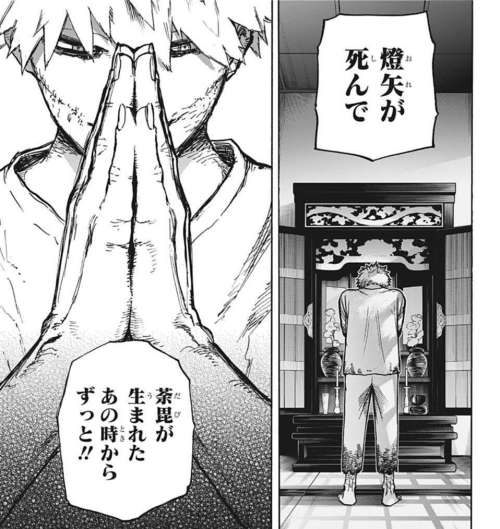
「燈矢(おれ)が死んで荼毘が生まれたあの時からずっと!!」
「燈矢 ; touya 」-> Touya
「おれ ; ore 」-> I
「が ; ga 」-> subject marker particle
「死んで ; shinde 」-> to die (and)
「荼毘 ; dabi 」-> Dabi
「が ; ga 」-> subject marker particle
「生まれた ; umareta 」-> was born
「あの ; ano 」-> that
「時 ; toki 」-> time
「から ; kara 」-> from
「ずっと ; zutto 」-> continuously
= “Touya (I) died and Dabi was born. Continuously since that time!!”
Of course, this wouldn’t be a Dabi chapter if there wasn’t a line of him where the kanji and furigana don’t match. In this case, it’s in the first part of the sentence. Although the kanji say Touya, so that’s what he actually means, the furigana read "I” (ore) so that’s what he says out loud. Obviously, both “I” and “Touya” refer to himself, but while he says “I” he is clearly not actually dead, so that’s why what he means by that is “Touya” - and just like Ujiko said a few lines ago, his body is only being kept alive out of spite, driven by deep resentment. Dabi exists out of vengeance and any other part that used to define Touya is gone.
This idea is also mirrored in him constantly saying that he doesn’t care about anyone or doesn’t feel anything anymore (aside from the physical numbness). The only emotion he is focusing on anymore and openly lets himself experience is his anger.
And with him having returned home with the hope of finding a changed and improved home environment there in order to find meaning for his suffering only to find the same sight that was there three years prior and thus concluding that his whole existence is meaningless, it makes sense that he feels as though he can’t allow anything else to exist anymore other than his anger.
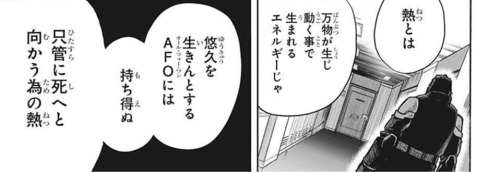
「熱とは 万物が生じ動く事で生まれるエネルギーじゃ 悠久を生きんとするAFOには持ち得ぬ 只管に死へと向かう為の熱」
「熱 ; netsu 」-> heat
「とは ; to wa 」-> indicates word being defined
「万物 ; banbutsu 」-> all things; all creation
「が ; ga 」-> subject marker particle
「生じ ; shouji 」-> to yield; to cause
「動く ; ugoku 」-> to move
「事 ; koto 」-> nominalized prior word/phrase
「で ; de 」-> with
「生まれる ; umareru 」-> to be born
「エネルギー ; enerugii 」-> energy
「じゃ ; ja 」-> to be
「悠久 ; yuukyuu 」-> eternity
「を ; o 」-> direct object marker
「生きんとする ; ikinto suru 」-> to try to live
「AFO ; ooru foa wan 」-> AFO
「には ; niwa 」-> as for
「持ち得ぬ ; machienu 」-> not being able to possess/have/maintain
「只管 ; hitasura 」-> devotedly; single-mindedly
「に ; ni 」-> at
「死 ; shi 」-> death
「へと ; e to 」-> to
「向かう ; mukau 」-> to face; to go towards
「為の ; tame no 」-> for the purpose of
「熱 ; netsu 」-> heat
= “Heat is energy born from all things living and moving. AFO, who tries to live forever, isn’t able to possess it. The heat with the purpose to devotedly head towards death.”
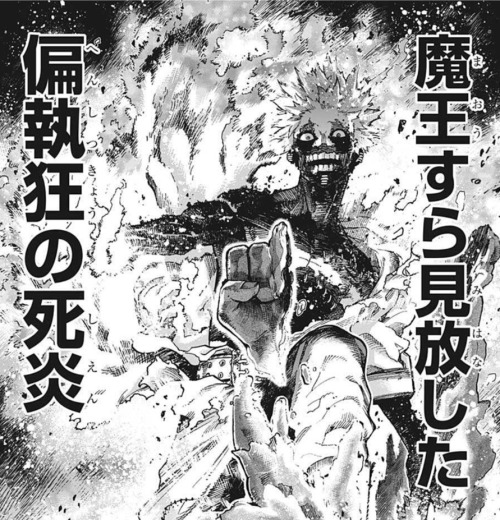
「魔王すら見放した 偏執狂の死炎」
「魔王 ; maou 」-> Demon Lord
「すら ; sura 」-> even
「見放した ; mihanashita 」-> abandoned; gave up on; deserted
「偏執狂 ; henshitsukyou 」-> monomania
「の ; no 」-> possessive particle; similar to an apostrophe
「死炎 ; shien 」-> death flame
= “Even the Demon Lord abandoned it. The death flames of monomania.”
Henshitsukyou describes a person that is unusually obsessed with one thing and shows a pathological attitude. In a way, it’s a more fancy and extreme version of referring to the tunnel vision Dabi has and with that a very fitting word.
Another thing worth noting is the word used for “abandon” - mihanasu. The first kanji in that word is the kanji that means “to see” - which is the whole theme of the Todoroki family, where the word “to see” gets repeatedly used. Even in this chapter, Dabi keeps using words like “to see” or “to show” (which are both written with the same kanji) several times after waking up from his coma. So AFO is another person that won’t look at Touya anymore. But unlike Endeavor, Dabi doesn’t care about whether or not AFO will look at him again.
Also, notice that last word - shien? The kanji for “flames” is being read as en here, which is also the name of the chapter.
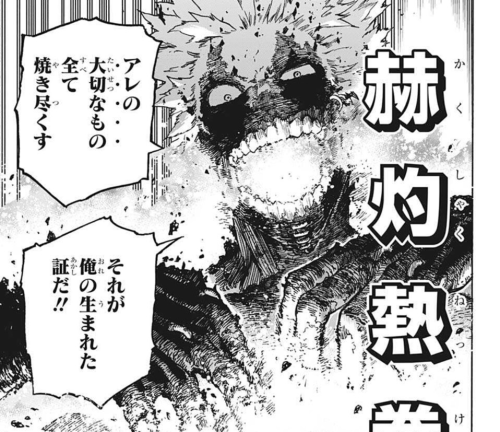
「アレの大切なもの全て焼き尽くす それが俺の生まれた証だ!!」
「アレ ; are 」-> that person; that thing
「の ; no 」-> possessive particle; similar to an apostrophe
「大切な ; taisetsu na 」-> important; precious
「もの ; mono 」-> thing
「全て ; subete 」-> all
「焼き尽くす ; yakitsukusu 」-> to burn completely; to burn to the ground
「それ ; sore 」-> that
「が ; ga 」-> subject marker particle
「俺 ; ore 」-> I
「の ; no 」-> possessive particle; similar to an apostrophe
「生まれた ; umareta 」-> was born
「証 ; akashi 」-> evidence; proof
「だ ; da 」-> be
= “I will burn everything precious to that thing to the ground. That is the proof that I existed!!”
I’ve mentioned before why are got translated as “that thing” and it’s definitely funny to hear him refer to Endeavor in this way. However, if you might have also noticed earlier, this is the same word that Ujiko uses when talking to the cop about Dabi. So both Dabi and Endeavor get referred to as “that thing” in this chapter and that is most definitely intentional. It’s an easy way to draw a parallel between the two characters - both consumed by their obsession for one single goal so much so that they are willing to hurt others in the process and not stop no matter what. When Dabi, during his reveal, said that his flames are Endeavor’s flames, it already showed how he essentially created himself as a shadow of his father, the personification of the damage he has caused, so it makes sense for both of them to also be referred to in the same way here.
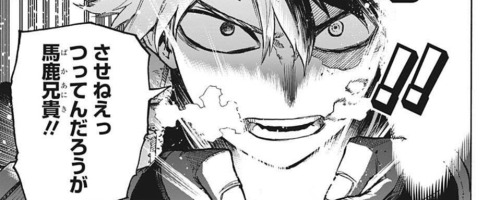
「させねえっつってんだろうが馬鹿兄貴!!」
「させねえっ ; sasenee 」-> will not let someone do something
「っつって ; tsutte 」-> I said (contraction of という)
「ん ; n 」-> explanatory particle
「だろう ; darou 」-> I think
「が ; ga 」-> used to seek agreement
「馬鹿 ; baka 」-> idiot
「兄貴 ; aniki 」-> big brother
= “I said I won’t let you do that, idiot big bro!!”
The ga here is used when getting someone to agree with you or to accuse them of a mistake. Even though Shouto told him he won’t let him go through with his plan, his big bro didn’t listen so Shouto is repeating himself as a reminder.
Shouto is also back with the baka aniki and don’t get me wrong, calling your big bro an idiot is super realistic but please, Horikoshi, let him call him “Touya-nii” to his face. I’ve mentioned before that aniki isn’t the nicest word, so you may wonder why he’s calling him “idiot big bro” here.
The short answer is: I don’t know why he keeps calling him that. Shouto only has two lines in this chapter and doesn’t really react to Dabi’s backstory, so trying to figure out why he calls him baka aniki is impossible and I’d rather wait and see how this plays out than come up with theories here.
What I do want to say in regards to this is that it feels like Shouto is being silenced/held back for now and will get his moment of showing his true feelings soon.
With Ujiko stressing how 16-year-old Touya shouldn’t have survived for a month and his body only being held together by his resentment it feels like a setup for there being more to Dabi’s quirk and hopefully, we will learn the truth soon, but it also hints at the fact that reaching out to him isn’t going to be an easy task. But it will happen. Maybe Shouto just needs to stop with the baka aniki first.
Overall, a very emotional chapter that gave us lots of new information and filled in some of the blanks. If it wasn’t clear enough before, this chapter basically spelled out the fact that Dabi loves his family. Despite his near-death experience and waking up surrounded by strangers telling him they’ll be his new family, he only thought about having to go back home to his actual family and wanting to apologize to them. So, no, Touya “I don’t care about anyone/I don’t feel anything” Todoroki does not hate his family and never has and once he’s saved he’ll definitely apologize to them.
There are still lots of open questions - such as what Dabi’s quirk really is, but maybe Horikoshi will shift the focus to other characters again next chapter so we’ll probably have to wait. At least this will give us some extra time to emotionally recover from this chapter.
It definitely added a lot to his character and despite all the sadness, it was also super fun to see him just… turn down AFO and walk away from him. I can’t imagine the mental damage AFO and Ujiko received from that. And to just walk back through the door after seven years even though they assumed he had died? Iconic. Whenever you think he can’t top himself anymore, he does it again.
Since this whole chapter was Dabi-focused this turned into a pretty long post, but if you made it this far I hope this could clarify/add some things regarding the chapter/characters.
Thanks for reading!
ninjaschooltime-blog liked this
toujours-black reblogged this from todomitoukei
 oikawakechiaplogist liked this
oikawakechiaplogist liked this  lun0521 liked this
lun0521 liked this  echoesofreverie liked this
echoesofreverie liked this mysoulisthemurderweapon liked this
 julisagittarius liked this
julisagittarius liked this  port4shippers reblogged this from todomitoukei
port4shippers reblogged this from todomitoukei  port4shippers liked this
port4shippers liked this scarlettcryptid liked this
toujours-black liked this
 purplepolkadots liked this
purplepolkadots liked this  solareclipse77 liked this
solareclipse77 liked this rainygirl2399 liked this
saeha liked this
 neo-stardust reblogged this from todomitoukei
neo-stardust reblogged this from todomitoukei salmabunny liked this
 stapledarsonist reblogged this from todomitoukei
stapledarsonist reblogged this from todomitoukei  stapledarsonist liked this
stapledarsonist liked this shou-chibi liked this
 sakuraminako23 liked this
sakuraminako23 liked this  fae-v1606 reblogged this from todomitoukei
fae-v1606 reblogged this from todomitoukei  fae-v1606 liked this
fae-v1606 liked this sonia-the-hedgehog-2369 liked this
spiritofwhitefire liked this
haleigh-sloth liked this
mothblossoms liked this
cyberspringroll liked this
greenmushroomhermit liked this
togairaa liked this
antiquity1111 reblogged this from todomitoukei
typpasjugari liked this
 skazochnoebali liked this
skazochnoebali liked this  toonlissi liked this
toonlissi liked this  badbussy123 liked this
badbussy123 liked this  4gby liked this
4gby liked this  mettywiththenotes reblogged this from todomitoukei
mettywiththenotes reblogged this from todomitoukei  mettywiththenotes liked this
mettywiththenotes liked this chibiarmygeneral liked this
 cisnkxsn liked this
cisnkxsn liked this scurrile-histrion liked this
 chitziburn reblogged this from todomitoukei
chitziburn reblogged this from todomitoukei todomitoukei posted this
- Show more notes

